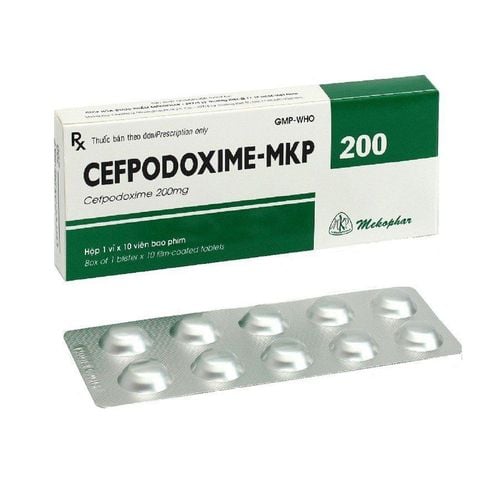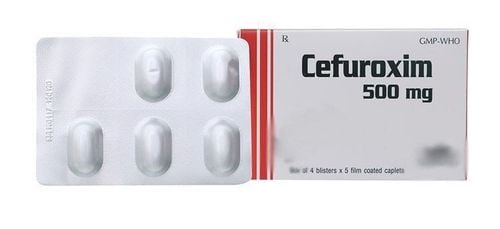This is an automatically translated article.
Emycin DHG 250 medicine has the main ingredient erythromycin and other excipients. This drug has been proven effective in the treatment of infections of the respiratory tract, gastrointestinal tract.
1. Uses of Emycin 250mg
The use of Emycin 250mg is proven in the following cases:
Treatment of respiratory infections such as: pneumonia, bronchitis... Treatment of diseases of the digestive tract: flatulence, difficulty diarrhea, constipation,... Treatment of skin and soft tissue infections. The drug is indicated in the treatment of neonatal conjunctivitis and Chlamydia conjunctivitis Prophylaxis of recurrent episodes of acute rheumatic fever. Pharmacodynamics: The erythromycin component in the drug belongs to the group of macrolide antibiotics, has a broad spectrum of action, helps bacteriostatic. At the same time, the drug has the effect of killing bacteria at high concentrations against susceptible strains. Erythromycin and other macrolides reversibly bind to the 50S subunit of susceptible bacterial ribosomes and inhibit protein synthesis. The effect of the drug is increased at slightly alkaline pH (about 8.5), especially with Gram-negative bacteria. Erythromycin has a broad antibacterial spectrum including Gram-positive cocci, Streptococcus pneumoniae, Streptococcus pyogenes, Staphylococcus aureus, Bacillus anthracis, Corynebacterium diphteria, Erysipelothris rhusioparthiae, Listeria monocyogenes.
However, for anaerobic bacteria such as Clostridium spp., Propionibacterium acne, Emycin dhg 250 has a moderate effect.
Pharmacokinetics: Erythromycin is widely distributed in fluids and tissues, especially in middle ear fluid, prostate fluid, and semen.
Erythromycin concentrations are highest in liver, bile and spleen Erythromycin has low concentrations in cerebrospinal fluid Between 70% and 90% of erythromycin is protein bound More than 90% of erythromycin is metabolized in the liver, partly as inactive; may accumulate in patients with severe hepatic impairment. Erythromycin is excreted mainly in the bile. Between 2% and 5% of an oral dose is excreted unchanged in the urine.
2. Contraindications
In some cases below, Emycin 250mg will not be allowed to be indicated:
Patients with hypersensitivity to any component of the drug, especially erythromycin Patients with liver dysfunction or a history of deaf. Emycin 250mg is not indicated for concurrent use with terfenadine, especially for patients with bradycardia, prolonged QT interval, and electrolyte disturbances.
3. Usage and dosage
3.1. How to use Emycin 250mg is taken orally and taken right before meals. The duration of treatment depends on the severity of each patient. However, at least the drug must be used for the entire course (5-10 days) to have a clear therapeutic effect.
3.2. Dosage The dosage information for Emycin 250mg is not a substitute for medical professional advice, so patients should consult their doctor or pharmacist before taking Emycin 250mg.
Children: The usual dose is 30 - 50mg/kg body weight/day, divided into 2-4 doses. Children under 2 years old: Take 1/2 sachet x 4 times/day (total dose 500mg/day). Children from 2 to 8 years old: Take 1 sachet x 4 times/day (1g total dose/day). In severe infections the dose may be doubled. 3.3. Emycin 250mg overdose Case of Emycin 250mg overdose occurs when the patient abuses the drug for a long time or takes the drug in large doses from 1-2 days. Some manifestations of overdose such as: abdominal pain, fatigue, dizziness, nausea, ..
At this time, the patient should be taken to a medical facility for emergency. Your doctor will prescribe epinephrine, corticosteroids, and antihistamines to manage allergic reactions. Gastric lavage to remove unabsorbed drug from the body should be done as soon as possible.
3.4. Missed dose of Emycin 250mg In case of missed dose, the patient can take it as soon as he remembers. However, avoid taking 2 doses too close together. If the interval between 2 doses is too short, you can skip the missed dose. Never take a double dose to make up for a missed dose.
4. Undesirable effects
During the use of Emycin 250mg, patients may experience some side effects such as:
Abdominal pain, vomiting, diarrhea, rash. Urticaria Anaphylactic reactions, cardiac arrhythmias, increased transaminases, increased serum bilirubin, intrahepatic cholestasis, reversible deafness. Not all patients using Emycin 250mg will experience the same side effects or may have other side effects that are not mentioned. Therefore, if you have any questions about the side effects of Emycin 250mg, the patient should. Please consult your doctor or pharmacist.
5. Drug interactions
Emycin 250mg medicine can interact with some drugs, change the mechanism of action of shared drugs or increase the side effects of drugs.
Do not combine astemizol or terfenadine with erythromycin because of the risk of cardiotoxicity such as torsades de pointes, ventricular tachycardia and death. Erythromycin may inhibit the metabolism of carbamazepine and valproic acid, increasing plasma concentrations of these drugs and increasing toxicity. Erythromycin may antagonize the effect of chloramphenicol or lincomycin. Erythromycin reduces the clearance of the following drugs: The xanthine such as aminophylin, theophylline, caffeine; alfentanil, midazolam or triazolam. This increases the concentration and duration of action of these drugs. Erythromycin may unduly prolong prothrombin time and increase the risk of bleeding during prolonged treatment with warfarin, by reducing its metabolism and clearance. Erythromycin increases ciclosporin plasma concentrations and increases the risk of nephrotoxicity. Erythromycin inhibits the metabolism of ergotamine and enhances the vasoconstrictor effect of this drug. Caution is advised when erythromycin is administered with lovastatin and may increase the risk of rhabdomyolysis. Above is important information about the side effects of Emycin 250mg, you can consult carefully before using to get the best treatment effect.
Please dial HOTLINE for more information or register for an appointment HERE. Download MyVinmec app to make appointments faster and to manage your bookings easily.













